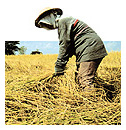 RURAL DEVELOPMENT: With 4,800 million baht to give away to community
organisations, the contoversial Social Investment Fund opens for business today.
Critics say it is, at best, a mere painkiller for the country's economic ills and,
at worst, another pool of perks to be abuse. Supporters, meanwhile, think the fund
will restore strength to Thai communities, offering them a say in how the money should
be spent
RURAL DEVELOPMENT: With 4,800 million baht to give away to community
organisations, the contoversial Social Investment Fund opens for business today.
Critics say it is, at best, a mere painkiller for the country's economic ills and,
at worst, another pool of perks to be abuse. Supporters, meanwhile, think the fund
will restore strength to Thai communities, offering them a say in how the money should
be spent
Atiya
Achakulwisut and Vasana Chinvarakorn
Pictures by Smith Sutibut
Phangnga fisherman Samroeng Rakhet recently heard about a huge chunk of money that Thailand has borrowed from the World Bank to help the poor. He is not sure, though, if his group of small-scale fishermen from the four southern provinces will be interested in applying for a funding.
"We already have our own saving groups which are doing pretty well," Mr Samroeng explains. "Our feeling is that we'd fare better not accepting outside money, even though it's free. The sense of ownership and responsibility won't be the same."
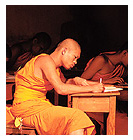 Northerner Angkarn Daengrueng sees it otherwise. Having worked with
Aids patients and their families, the NGO staffer is optimistic that the fund will
help poor villagers.
Northerner Angkarn Daengrueng sees it otherwise. Having worked with
Aids patients and their families, the NGO staffer is optimistic that the fund will
help poor villagers.
"Such a funding scheme is beneficial to community development as long as they invest the money in projects that have long-term effects. Not projects like road building which only generate jobs for a few days," says Mr Angkarn.
Open for funding applications today, the Social Investment Fund (SIF) has met with mixed responses since its first public hearing in May this year. Criticism ranges from the project's ideological stance to its methods of implementation.
Critics say the operating capital for the SIF - a loan worth US$120 million (about 4,800 million baht) - should have been sought as non-returnable aid. Others disagree with the SIF's giving away the money to villagers for free instead of lending it. Meanwhile, sceptics point out the potential for bureaucratic red tape and corruption, long associated with large-scale government projects.
And there are other questions that need to be answered: Will the SIF end up being just another pork barrel project? How can the SIF committees ensure the process of screening over 4,500 applications will be done fairly? What indicators will they use to assess the impact of the project? And won't the SIF loan just add a bigger burden to Thai taxpayers when the time comes to pay back the World Bank?
Amid the criticism and concern, the creators of the SIF concept believe the benefits will eventually outweigh the potential losses. Thailand's business moguls have failed in their high-flying investment schemes, resulting in the current national financial crisis. So why not try a different approach - investing in people instead of real estate, investing in society itself, from the bottom-up? The results may be less spectacular, but who knows: they may also last longer.
NEW PARADIGM OF INVESTMENT
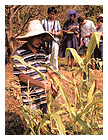 Participation of villagers has been an oft-quoted goal of past government
development schemes, though they have tended to turn out otherwise: plagued with
public apathy and lack of relevance, and the money siphoning off into the hands of
few individuals.
Participation of villagers has been an oft-quoted goal of past government
development schemes, though they have tended to turn out otherwise: plagued with
public apathy and lack of relevance, and the money siphoning off into the hands of
few individuals.
For Mr Anek Nakhabutr, Director of the Social Investment Fund Office (SOFO), a new set-up under the Government Savings Bank, the SIF presents a new alternative that attempts to correct past failures.
"We believe that Thailand's real asset is its social capital; in other words, the strength of its community organisations. This is the first time in Thailand that a development budget has not been channelled through or administered by state agencies," says Mr Anek, who has worked in community development for over two decades.
Unlike past efforts - characterised by paternalism, a "state-knows-best" attitude, and centralisation - the SIF will be implemented, at least in theory, in a demand-driven, open-ended and flexible manner. The fund does not identify projects in advance, but responds to needs as perceived and requested by local organisations.
Any community organisation that has been up and running for at least one year is eligible to submit a funding proposal (see sidebar). Comparison with another, bigger chunk of the World Bank's"social loans" sheds more light on the SIF's unique features.
Under the umbrella of Social Investment Programmes (SIP), about 16 billion baht has been administered by four core ministries, and the public has not been informed of how the money is being spent.
The SIF, on the other hand, has revealed details of where the money goes. Why do we need to invest in this so-called "social capital"?
Dr Ammar Siamwalla, economist from the Thailand Development Research Institute and the Chairman of SIF's Executive Committee explained that the past "get-rich-quick" economic growth has resulted in self-interested individualism. It destroyed traditional values such as sharing, fraternity and mutual aid, which once held a community together.
"This project aims to revive the intermediary web of relations, which we believe is a basis for stronger communities, and thus it will not only ensure the well-being of the poor or those affected by the economic downturn, but also reduce their dependence on government money," says Dr Ammar.
The economist and the social worker agree that grassroots community strength is essential if the country is to see economically-sound and socially-fair development.
Funding proposals will not only be appraised against a set of indicators, typical of state projects, but also - and here's the SIF's brainchild - be screened and monitored by civic forums existing in each area.
"We added this element because we want to foster the growth of civic forums in Thai society," says Mr Anek. "Examples are environmental groups, universities, businesses - any group with a civic mind. We believe that the seed is already here, although the degree of strength varies from place to place."
Dr Ammar adds: "We won't accept an ad hoc group set up just to ask for the money. Moreover, the SIF is different from the usual government approach in one important way: none of the so-called development activities are to be standardised nationwide. We try to encourage diversity in terms of geographical locations. We will not prioritise people's needs."
Nor is the SIF looking at issues in isolation from one another. Although Dr Ammar admits to the pressing problem of unemployment, notably high in the northeastern region, he insists the programme is not created exclusively to handle the jobless problem.
Rather, the types of activities to be supported by the SIF are myriad, ranging from saving groups, demonstration centres, to shelters for Aids patients and capacity building in communities.
Observes Ruengrawee Phichaikul, of Asia Foundation, who took part in brainstorming sessions on how the SIF should operate: "We won't focus on economic problems at the expense of social ones. That was the old paradigm of government projects, although the mode of thought continues to prevail even now. I also proposed that the committee add gender perspectives to the scope of activities that will be supported by SIF."
POINTS OF CONTENTION
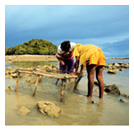 In its effort to be innovative and transparent, the SIF has inevitably
opened itself up to public scrutiny and criticisms. Critics are concerned that the
differences in opinion may heighten the existing divisions in society, while supporters
welcome the phenomenon as a sign of diversity and civic progress.
In its effort to be innovative and transparent, the SIF has inevitably
opened itself up to public scrutiny and criticisms. Critics are concerned that the
differences in opinion may heighten the existing divisions in society, while supporters
welcome the phenomenon as a sign of diversity and civic progress.
One major worry raised by critics is that the programme may fall into the same pitfalls as the government's previous large-scale redistribution of funds; in particular, the Revolving Fund (ngoen phan) scheme during Kukrit Pramoj's regime. At the time, the programme was seen as myopic, providing perks for a few, while the benefits reached very few villagers, and the fund fizzled out quickly once the money was gone.
Mr Chatchawal Thongdeelert, chairman of the NGO-coordinating committee in the North, cautions that news of a large sum of money to be given away to villagers might create unreal needs in local communities. Projects may be proposed that stem not from necessity, but desire.
"The most important process in community development is getting people organised and helping them analyse their problems and define their real needs. That process can take years. I don't believe a project like the SIF, constrained by a short period of time, would be able to do that."
Mr Dej Phoomkacha, of the Thai Volunteer Service Foundation also notes the entrance of money tends to bring about conflicts in a village among the so-called village elite, namely the headmen, kamnan and the Tambon Administrative Organisations, who have a better chance of exploiting the funding.
Fisherman Samroeng agrees: "There is a key difference in where the money comes from. If it's the villagers' own money, the concern and monitoring will be far more rigorous than if it's considered a mere giveaway."
To a certain degree, both supporters and critics of the SIF agree that once the funding is allocated, the grassroots people themselves must monitor how it is spent.
But SOFO Director Dr Ammar concedes that SOFO is not legally empowered to punish those funding recipients who may abuse or violate the conditions of their contracts. However, he expects that the transparent process, wherein all members will be informed of the details of the contract and be expected to contribute at least 10 percent in cash or kind to each project, will result in a better sense of ownership and accountability.
"There will also be a census of community organisations that submit applications to receive other government funding to avoid duplication," says Dr Ammar.
Apart from the potential for abuse, another contentious issue is ideology. Dr Ammar says he is less concerned about where the money comes from.
"I understand that the World Bank and the IMF have made mistakes in the past. But are they intent on destroying Thailand? I don't believe so. The SIF is, in itself, a good project. I don't care about the colour of the money, unless it is really dirty," he says.
As for criticisms that the World Bank should have given the social investment money to Thailand for free instead of as a loan, Dr Ammar finds that amusing.
"Do you see the word 'bank' in 'World Bank'? And have you ever seen a bank giving away money?" he says.
Mr Dej, meanwhile, holds the World Bank, the SIF's funding agency,as responsible for the social problems facing Thailand right now.
"They are part of the same packages: the World Bank and the IMF. The latter imposes stringent policies that lead to the government's drastic cut in social budgets. Then, the World Bank took over, and they will not only earn the interests, but also the positive image of stepping in to help Thailand."
Still, Mr Dej of the Thai Volunteer Service Foundation believes that in the end, most community organisations will join the SIF bandwagon, as the grant is "relatively easy to get". The only exceptions he foresees are some networks of grassroots organisations that have developed their level of understanding of social problems to the point where they believe that worthwhile changes must occur at the structural level.
Pragmatists like Ms Ruengrawee of the Asia Foundation, however, agree that society needs some sort of dissenting voices, but the cash injection is also necessary for the poor on a thin lifeline right now.
METHODS OF EVALUATION
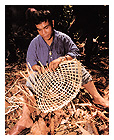 "Evaluation is the very first question I asked once agreeing
to do the project," Dr Ammar says.
"Evaluation is the very first question I asked once agreeing
to do the project," Dr Ammar says.
His concern is other people's fear. What the SIF seeks to accomplish - enriching a sense of belonging, kinship and social links; the kind of community values that the SIF terms "social capital" - is, at best, vague and difficult to measure.
"At this stage," Dr Ammar continues, "we only have broad guidelines. Basically, we will see if a project's objective is met. Are organisations who receive funding stronger, and how permanent is it?"
According to Mr Anek, some of the indicators include the amount of savings, welfare services, diversity on the part of both members and leaders each funding recipient can create. These criteria reveal the group's strength in management, social cohesion and human resources respectively.
However, northern NGO coordinator Mr Chatchawal comments that community development is a time-consuming process. It can take up to 10 years before an attempt yields any results. The process of getting organised and deliberating what are the real needs of a group takes the longest time in the development process. He is afraid that by the time villagers were ready to spend the money, it would have been time for evaluation. As a result, there would be little, if any, outcome to be assessed.
Since the SIF will deal with a very large number of projects from all across the country, Dr Ammar says it is unavoidable that the SIF will make two mistakes: one is accepting inappropriate projects, the other is rejecting good ones.
There might be some inferior projects that are accepted, he admits. But his greater concern is that the good projects are funded. Also, he sees the challenge as designing a process that will not screen out good projects in the early stages.
BENEFITS FOR SOCIETY
Apart from differing viewpoints about the philosophy behind the SIF, opinions about what kind of impacts the fund will create are also poles apart. Some say it will make sweeping changes in the landscape of Thailand's community development. Others argue that the fund is just throwing money at a massive set of social problems; its benefits, if any, will be insignificant.
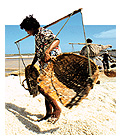 Mr Kamal Malhotra, co-director of Focus on the Global South, said
that the social investment fund was a response by the World Bank and IMF to criticism
of the drastic Structural Adjustment Programs (SAPs) - devaluation, freezing wages,
ending subsidies, privatisation, etc. - the IMF prescribed to countries asking for
a bailout.
Mr Kamal Malhotra, co-director of Focus on the Global South, said
that the social investment fund was a response by the World Bank and IMF to criticism
of the drastic Structural Adjustment Programs (SAPs) - devaluation, freezing wages,
ending subsidies, privatisation, etc. - the IMF prescribed to countries asking for
a bailout.
"The IMF supposed that the pain caused by the SAP would be short-lived and transitional. The SIF, therefore, was designed as a social safety net that would relieve the pain among people who are affected by the belt-tightening measures. Something like a painkiller," Mr Kamal says.
The transition, he believes, is not short term at all. In some countries, like those in Latin America or the Philippines, the poor have never seen the upside of economic development since they were subject to the SAPs over a decade ago.
As for the case of Thailand, Mr Kamalthinks a big part of the problem now is the IMF's package itself, which contracted the economy more than neccessary.
"The budget cut reduced public spending, while the high interest rate killed companies that might have still been viable. The contraction has spilled from the bubble to the real economy. This is what created such a high rate of unemployment and other social problems."
Mr Kamal's criticism of the SIF is, that without a major change to the SAPs, it seems unlikely the SIF will be able to deal with problems that are huge and growing, not reducing.
"No amount of money can lessen pain on this scale. Thailand's SIF, so far that I know, has a relatively small budget. I don't believe it would be able to cope with the depth and breadth of the true problems," he comments.
According to Mr Anek, money from the SIF might instigate some demand in the rural sector, which could bring some fresh liquidity to the macroeconomy. However, he insists that to understand the fund's real merit, one needs to look beyond output in terms of money.
"We have to think in terms of social management, whether we are successful in building social infrastructure that would help us cope with a worse crisis. If people in the rural sector can build up their social capital, they would be able to take care of themselves. They would not destroy the forest, become prostitutes, trade in drugs or commit crimes. And the government would save alot of public money if it does not have to solve these problems," he says.
Mr Anek is aware that there is an inherent risk in managing such a large amount of public money for such an ideal goal as strengthening community-based organisations. But he is confident we, as a country, have a lot to learn from this risk.
"What we are facing now is not merely an economic crisis but cultural disintegration. It hasn't occurred to many Thais that to have a strong society that will survive any crisis, we have to help the poor to stand by themselves first. People are poor because they lack opportunities, not money. If they have social capital to draw on, they would be able to make use of their potential," Mr Anek says.
It remains to be seen how much the SIF will be able to achieve. But at least this much is true. The fund has highlighted again ideals spurned by Thais in the rush to modernise, such as restoring a sense of place and self-care in grassroots organisations.
And despite different opinions on the SIF, both pro-and anti-SIF camps agree that values like solidarity and generosity contribute strongly to establishing social cohesion, and to making our lives more meaningful. They are values without which no society is viable.
Intellectual debates may go on. But the pragmatic Ms Ruengrawee says it's time for action: "It is the time to take some risks. Otherwise, the government officers will perpetuate the notion that villagers will never be ready to implement and monitor their own projects."